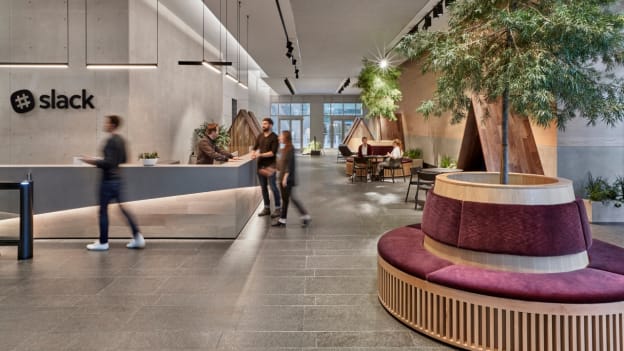After layoffs, Slack looks to recruit fired employees for AI innovation

Despite facing increasing pressure to downsize, and with Salesforce apparently still recovering from its hiring surge during the pandemic, the company is embarking on a new hiring initiative, beginning with its messaging subsidiary, Slack.
According to a message reviewed by Fortune, Slack CEO Lidiane Jones informed the staff on Tuesday that the company intends to hire a substantial number of new positions in Q3. These roles will primarily be for the product development engineer (PDE) team and will involve working on generative AI projects as well as enhancing Slack features such as Huddles and Lists.
Notably, this hiring initiative comes less than six months after Slack's parent company, Salesforce, implemented significant layoffs, cutting around 10% of its workforce, approximately 8,000 employees, in Q1 of this year.
"We will bring in top talent from across the industry to achieve these goals. Our hope and aim is to welcome back some former Slack employees among these new hires whose skill sets can help us move this exciting work forward. I can't wait to see what we can accomplish together in FY24," Jones wrote.
The exact number of Slack employees affected by Salesforce's Q1 layoffs, which included 8,000 companywide employees, remains unclear. However, by considering the possibility of rehiring some of the workers who were previously laid off, Slack joins the ranks of tech companies making staffing reversals as they navigate a challenging economy and strive to reduce expenses. Notably, Twitter made headlines when it sought to reemploy specific staff members shortly after a significant downsizing orchestrated by its owner, Elon Musk, in November.
"We're looking to hire great people that have the skill sets to move our work forward—whether those are new hires into Slack or those who worked here at any time in the past," a Slack spokesperson told Fortune.
As Slack's parent company, Salesforce, intensifies its AI initiatives and expresses a positive outlook on the technology, the new hiring plans align with these efforts. CEO Marc Benioff elaborated on the company's ambitious AI endeavour during the most recent earnings call, sharing an anecdote about a dinner conversation with his esteemed neighbour, Sam Altman, the founder of OpenAI.
Benioff also predicted an upcoming "supercycle" for AI and emphasised that CEOs will need to make assertive investments in AI to maintain their competitiveness.
CNBC reported that Salesforce has recently unveiled Einstein GPT, an innovative generative A.I. tool focused on improving the efficiency of sales, marketing, and customer service agents. In a blog post, Salesforce also revealed its ongoing efforts to develop several other "GPTs," such as Sales GPT, Service GPT, Marketing GPT, Commerce GPT, Slack GPT, and Tableau GPT.
Amidst the ongoing A.I. frenzy in the industry, Benioff seems to be swiftly moving past the recent challenges faced by the company. Salesforce narrowly averted a proxy fight with activist investors who had been urging the company to implement cost-cutting measures.
In response to this pressure, Salesforce announced the aforementioned layoffs and revealed plans to reduce costs by $3 billion to $5 billion. Additionally, the board's mergers and acquisitions committee was dissolved as part of these measures.
In a recent episode of Bloomberg's Odd Lots podcast, former CEO of Slack, Stewart Butterfield, voiced his criticism of the hiring frenzy that swept through Silicon Valley. Butterfield referred to it as the "source of all the excess," attributing it to the absence of hiring constraints and managers' desire for prestige.












